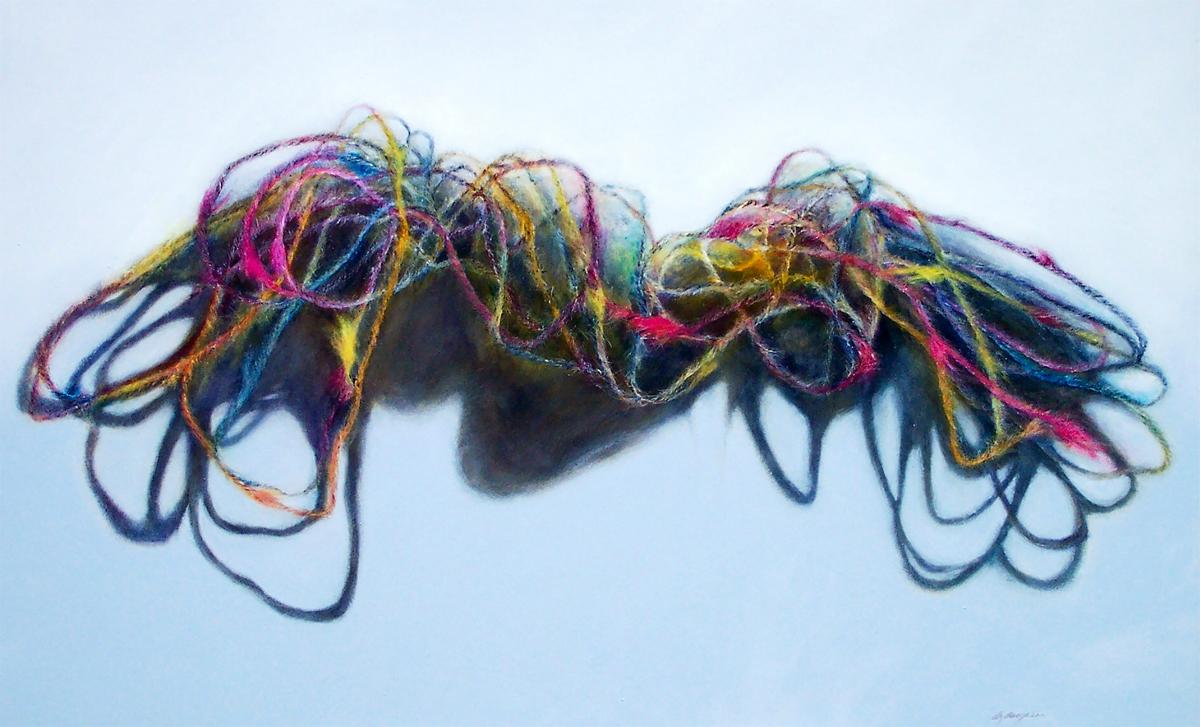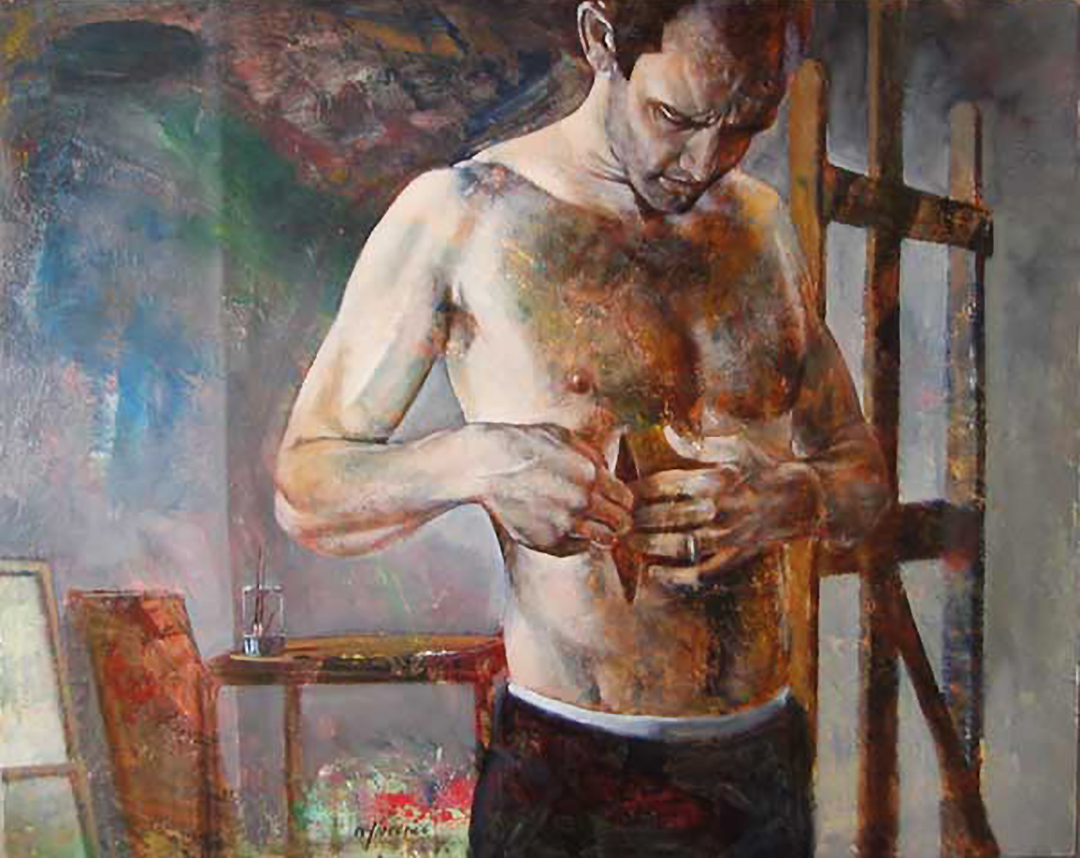December 7: A Call to Persevere
♫ Music:
Day 5 - Thursday, December 7
Title: A Call to Persevere
Scripture: Jude 17-23
But you must remember, beloved, the predictions of the apostles of our Lord Jesus Christ. They said to you, “In the last time there will be scoffers, following their own ungodly passions.” It is these who cause divisions, worldly people, devoid of the Spirit. But you, beloved, building yourselves up in your most holy faith and praying in the Holy Spirit, keep yourselves in the love of God, waiting for the mercy of our Lord Jesus Christ that leads to eternal life. And have mercy on those who doubt; save others by snatching them out of the fire; to others show mercy with fear, hating even the garment stained by the flesh.
Poetry:
To Live in the Mercy of God
By Denise Levertov
To lie back under the tallest
oldest trees. How far the stems
rise, rise
before ribs of shelter
open!
To live in the mercy of God. The complete
sentence too adequate, has no give.
Awe, not comfort. Stone, elbows of
stony wood beneath lenient
moss bed.
And awe suddenly
passing beyond itself. Becomes
a form of comfort.
Becomes the steady
air you glide on, arms
stretched like the wings of flying foxes.
To hear the multiple silence
of trees, the rainy
forest depths of their listening.
To float, upheld,
as salt water
would hold you,
once you dared.
To live in the mercy of God.
To feel vibrate the enraptured
waterfall flinging itself
unabating down and down
to clenched fists of rock.
Swiftness of plunge,
hour after year after century,
O or Ah
uninterrupted, voice
many-stranded.
To breathe
spray. The smoke of it.
Arcs
of steelwhite foam, glissades
of fugitive jade barely perceptible. Such passion—
rage or joy?
Thus, not mild, not temperate,
God’s love for the world. Vast
flood of mercy
flung on resistance.
A CALL TO PERSEVERE
As we enter Advent, a season dedicated to expectant longing and hope, it almost goes without saying that we are living in a time where many feel fearful and hopeless. Nearly every day, most of us will encounter someone who is in the midst of confusion, painful circumstances, challenging relationships, or personal loss. A call to persevere to one who is grieving can be easily mistaken as an attempt to minimize or over-simplify their process of navigating real pain and heartache.
Today’s Scripture, images, music and poetry present us with tangible ways to persevere in times of hardship and complexity by focusing our hearts and minds on God’s immense mercy. As we prepare our hearts to celebrate the Incarnation, we are struck by the tremendous complexity inherent in this timeless narrative: darkness waiting for the light; the hope of a Savior amidst the scandal of an unwed teenage girl; the mystery of God becoming man to live among us.
We are presented with two artistic images that visually invite us to explore complexity: Soft Kill by Doris Auxier, a delicate and bright tangle of yarn casting a dark and almost ominous shadow; and Nathan Florences’ Self Doubt depicts an artist, standing in front of an easel as he inspects a wound in his own side. Both artists portray images that convey puzzling and intricate imagery. Clearly, multiple meaning and interpretations are possible, and neither would easily lead the observer toward a simple black and white conclusion or interpretation.
Jude 17-23 portrays the exhortation to keep ourselves in the love of God and to wait for the mercy of our Lord Jesus Christ. Yet Jude, too, hints of complexity in terms of how we should treat those who doubt, suggesting several possible approaches to those whose faith is wavering.
The beautiful and haunting words of Denise Levertov’s poem, To Live in the Mercy of God, weaves together the ideas of perseverance and God’s mercy. She vividly describes God’s mercy as dropping upon us like rain that quenches us; bread that feeds us; and arms that hold and comfort us. The wonder of this vast and pervasive mercy is the way it surrounds us and upholds us, whether we long for it or whether we resist it.
Levertov depicts God’s perseverance in extending His mercy by using the forceful image of water cascading onto rock, Even in the midst of encountering resistance, God persists—hour after year after century—in passionately loving His world and embracing His people, in His all-encompassing mercy.
With insightful and carefully chosen words, Levertov portrays God’s love as a vast flood of mercy“—not mild, not temperate.” The fullness of the Incarnation in all its cost and complexity, is surely the most magnificent display of the heartfelt mercy and persevering love of our God, something we will ponder throughout the weeks of Advent. And in the midst of whatever current challenges that require us to wait, trust, and persevere, our great God of love and mercy is with us. The translation of today’s Gregorian chant, “Communio: Dicite Pusillanimes” provides us with these words of genuine encouragement: “Let the fainthearted take comfort, and fear nothing: behold, our God will come and save us.”
Prayer:
Lord Jesus Christ,
You are the sun that always rises, but never sets …
You are the source of all food, material and spiritual,
Nourishing us in both body and soul.
You are the light that dispels the clouds of error and doubt,
And goes before me every hour of the day,
guiding my thoughts and my actions.
May I walk in your light, be nourished by Your food,
be sustained by your mercy,
and be warmed by Your love.
Amen. –Erasmus (1466-1536)
Dr. Deborah Taylor
Provost and Senior Vice President
Biola University
About the Artwork #1:
Soft Kill, 2004
Doris Auxier
Acrylic on canvas
38 x 60”
Artist Doris Auxier’s current paintings, drawings, and installations have focused on soul care and transformation. Of her work Soft Kill, Auxier states “All the bright, luminous colour speaks of God infusing us with His glory, His righteousness, in the midst of our tangle of doubts. Astonishing thoughts like, “I will never be more righteous than I am right now” are behind it. I may be a mess, but it’s Christ’s righteousness that untangles me from my confusion and gives me peace. This painting is about the tangle becoming still and unclenched, surrendering to God’s mercy.”
About the Artist #1:
For the past fifteen years, artist Doris Auxier’s (b. 1952) paintings, drawings, and installations have focused on fragile and protected ecosystems in British Columbia, Canada. Her interest has been on revealing the interior, which is so often obscured and unnoticed, by focusing on the surface qualities of beauty, power, and charisma. Her latest work picks up threads from earlier works that touch on primal loneliness and what it means to become truly human. She states, “In The Four Loves, C.S. Lewis talks about our whole being he identifies its very nature as being: one vast need; incomplete, preparatory, empty yet cluttered, crying out to Him who can untie things that are now knotted together and tie up things that are still dangling loose.” Auxier is Associate Professor of Art and Design at the School of the Arts, Media and Culture at Trinity Western University in Langley, British Columbia.
About the Artwork #2:
Self Doubt
Nathan Florence
Oil on canvas
A “Doubting Thomas” is a skeptic who refuses to believe without direct personal experience—a reference to the Apostle Thomas, who refused to believe that the resurrected Jesus had appeared to the ten other apostles, until he could personally see and feel the wounds received by Jesus on the cross. In Self-Doubt, we see the artist, standing in front of an easel, inspecting a wound in his own side.
About the Artist #2:
Nathan Florence studied art at Swarthmore College in Philadelphia, Pennsylvania, and at the International School of Art in Todi, Italy. He lives in Salt Lake City, Utah, with his wife, Marian, and their two children, where he chairs the art department at the Waterford School in Sandy City, Utah. David Dee, Director of the Utah Museum of Art, describes Florence’s paintings as “both intellectually and visually captivating. His paintings combine extraordinary skill and old-master quality painting with a contemporary consciousness.” The subjects of Florence’s paintings vary widely from small landscape paintings to large figurative compositions that express his faith and deal with contemporary social issues.
About the Music:
“Communio: Dicite Pusillanimes” from the album Graduale Project Year 4, Part 1
Lyrics:
Dicite:
Pusillánimes confortámini,
Et nolíte timére:
Ecce Deus noster véniet,
Et salvábit nos.
Translation:
Say:
Take courage, you who are fainthearted,
And do not fear;
Behold, our God will come,
And he will save us.
About the Gregorian Chant:
Gregorian chants are the central tradition of unaccompanied sacred song of the Roman Catholic Church born from the church’s liturgy. Its texts are almost entirely scriptural and composed in Latin, coming for the most part from the Psalter. For centuries Gregorian chants were sung as pure melody, in unison, and without accompaniment. The Gregorian chant is in free rhythm, without meter or time signature. Although popular legend credits Pope St. Gregory the Great with inventing Gregorian chant, scholars believe that it arose from a later Carolingian synthesis of Roman chant and Gallican chant.
About the Performer:
Slovakian tenor Marek Klein specializes in Gregorian chant and has undertaken to record all the chants of the Graduale Romanum. The Graduale Romanum contains the official Roman Catholic liturgical chants used in Mass, including this ancient chant commonly sung during communion on the Third Sunday of Advent. The text is taken from Isaiah 35:4.
About the Poet:
Denise Levertov (1923-1997) was educated entirely at home and claimed to have decided to become a writer at the age of five. When she was twelve, she sent some of her poetry to T. S. Eliot, who responded encouraging her to continue writing. At age seventeen, she had her first poem published in Poetry Quarterly. Her poems of the 1950s won her widespread recognition and her book, With Eyes at the Back of our Heads (1959), established her as one of the great American poets. Levertov went on to publish more than twenty volumes of poetry, and was also the author of four books of prose. Levertov’s conversion to Christianity in 1984 was the impetus for her religious poetry. In 1997, she brought together 38 poems from seven of her earlier volumes in The Stream & the Sapphire, a collection intended, as Levertov explains in the foreword to the collection, to "trace my slow movement from agnosticism to Christian faith, a movement incorporating much doubt and questioning as well as affirmation."
About the Devotional Writer:
Dr. Deborah Taylor is currently the Provost and a Senior Vice president of Biola University. She has both BA and MA degrees from Biola University, and earned her PhD with an emphasis in educational research and assessment from Claremont Graduate University. Deborah spent nine years in the Biola University School of Education teaching children's literature, foundations of education, student-teaching seminars, and first-year seminars for incoming freshmen. During the past six years, Deborah has also been active in Biola University's Diversity Leadership Committee.

